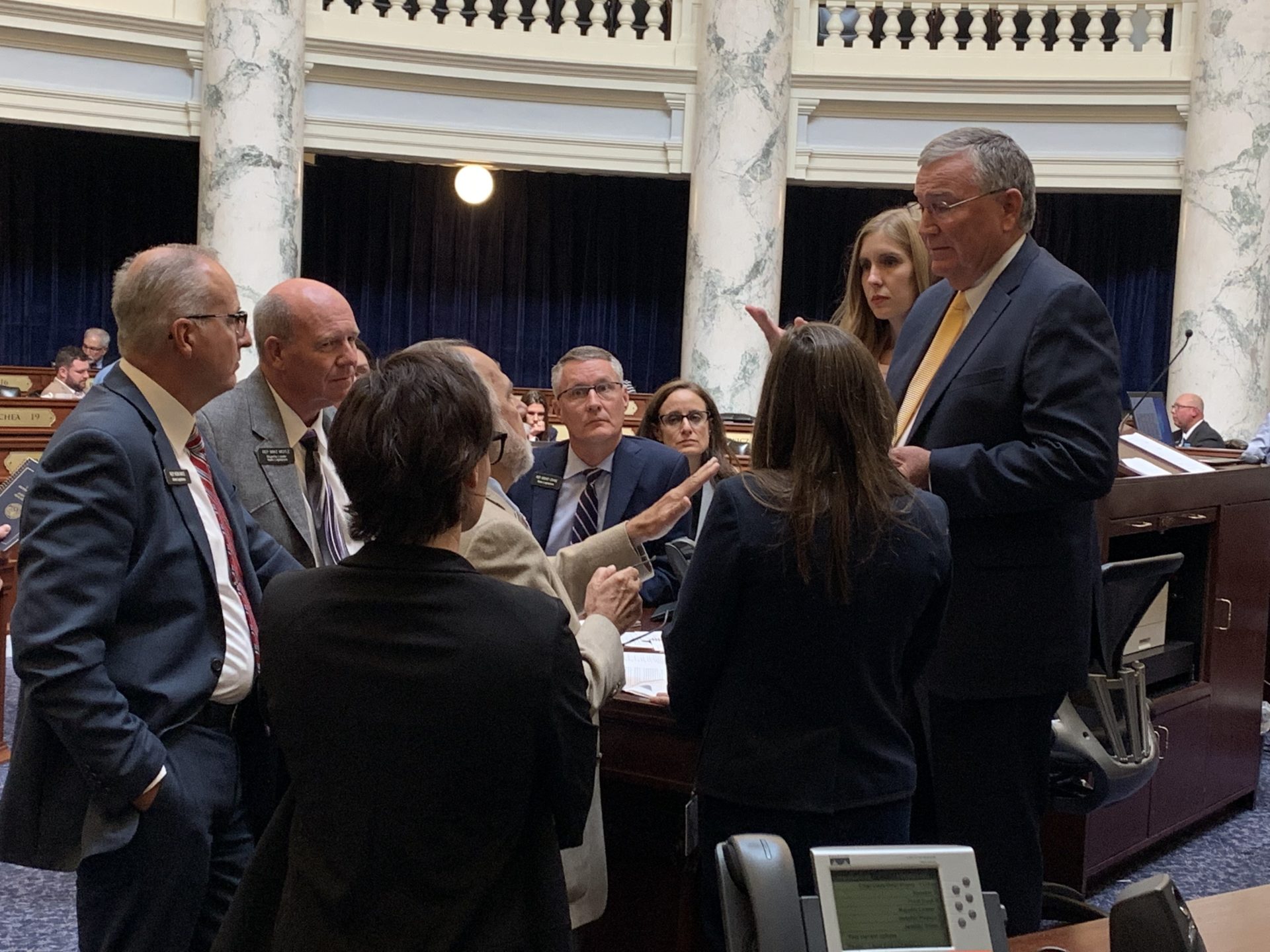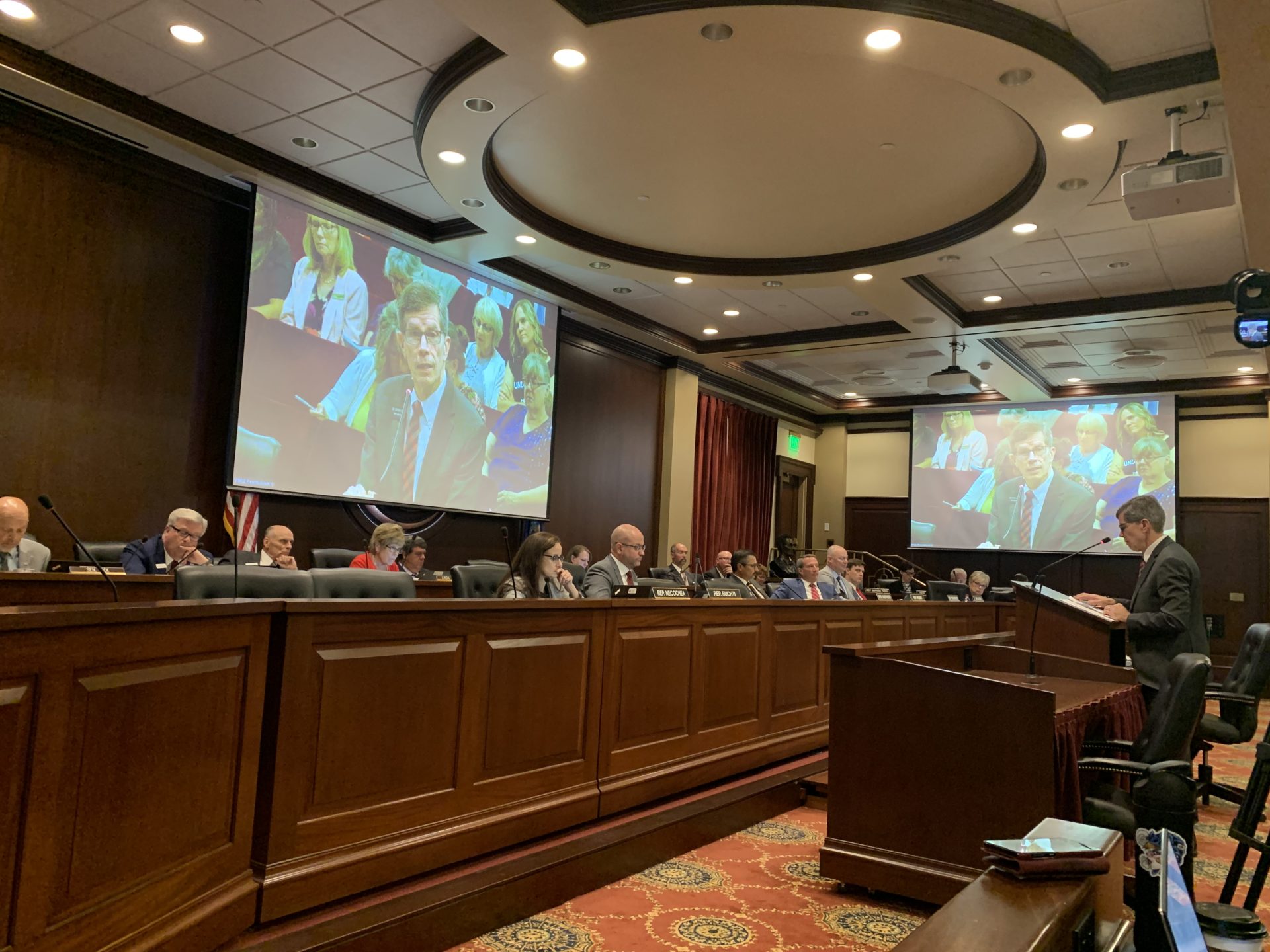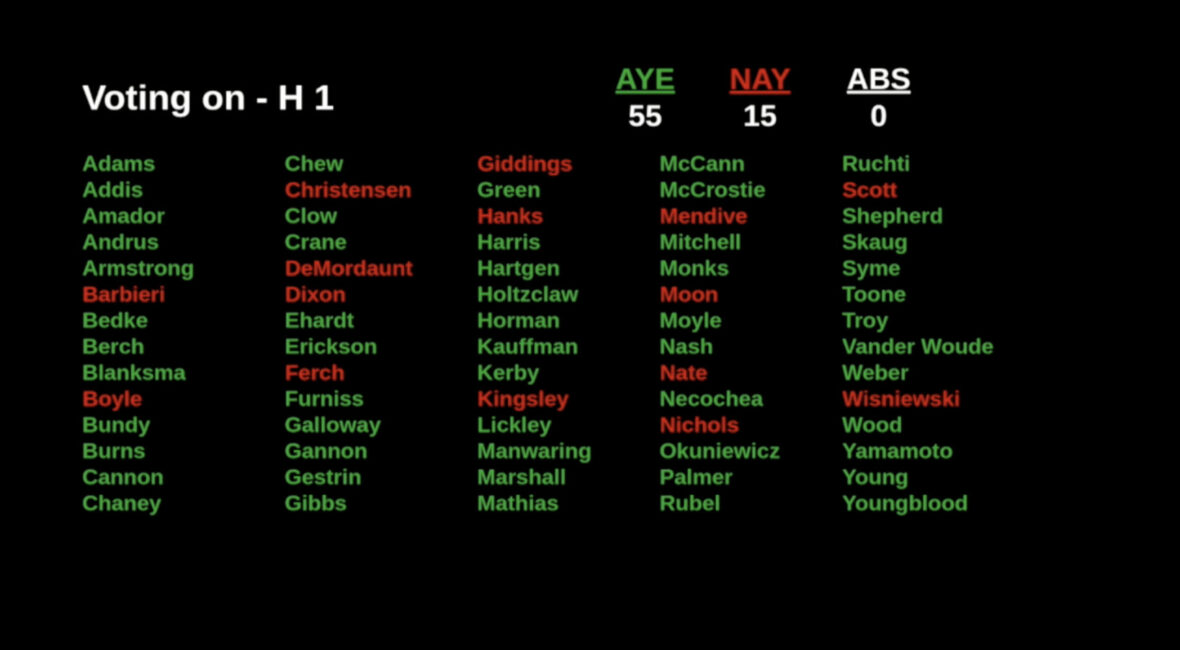
(UPDATED, 6:59 p.m., with details from the Senate, and Little’s signature on HB 1.)
With only one bill on the agenda — but with more than $1 billion on the line — a far-ranging tax and education makeover became law within 10 1/2 hours Thursday.
After more than 90 minutes of debate late Thursday afternoon, the Senate passed Gov. Brad Little’s House Bill 1 on a 34-1 vote, sending the bill to the governor’s desk. Earlier in the afternoon, the House passed the bill by a 55-15 margin.
The Senate adjourned for the day — and most likely, for the year — at 6:21 p.m. The House gaveled out at 6:29 p.m. Sandwiched in between: Little quickly signed HB 1 into law at 6:27 p.m.
Known in Statehouse parlance as a special session, or “extraordinary session,” Thursday’s debates focused on a proposal to provide $500 million in one-time tax credits, $150 million in ongoing income tax cuts and $410 million in ongoing education funding. The omnibus bill passed barely two months before the November elections — when Little faces re-election, when all 105 legislative seats are on the ballot, and when voters will consider a citizens’ initiative also designed to boost education funding.
Little unveiled the bill, and called the special session, on Aug. 23. But the bill that passed the Legislature Thursday is different in one significant way: It eliminates a 3% annual “multiplier,” to grow a $330 million-a-year K-12 fund.
‘A boatload of money,’ and a far-reaching bill
Little expressed one overarching goal for the special session: helping households and schools cope with inflation that has reached a 40-year high.
And a record-setting surplus — now projected at $2 billion — provided Little with a funding source for HB 1.
Legislative leaders also said they were ready to tap into the surplus.
“From my point of view, we have a boatload of money,” said House Revenue and Taxation Committee Chairman Steven Harris, R-Meridian, introducing the bill during the committee’s first hearing Thursday morning.
But while Little stated a single objective, HB 1 contained several components: the one-time tax rebates; a permanent income tax reduction, establishing a single, flat 5.8% rate; a $330 million-a-year sales tax earmark for K-12; a new, $80 million education fund designed to prepare students for high-demand jobs. HB 1 adds a non-binding advisory vote to the November ballot.
But the bill’s scope became a recurring question Thursday. Critics said the bill violated the Idaho Constitution, which confines all pieces of legislation to a single subject.
Fielding a question on the topic Thursday morning, Harris said he believed the bill was constitutional. “(But) that would be addressed, obviously, by the courts.”
Attorney General Lawrence Wasden’s office weighed in on the topic as well. In an Aug. 26 opinion, requested by Sen. Melissa Wintrow, D-Boise, chief deputy Nicole McKay said HB 1 was “likely to survive” a constitutional challenge.
Throughout the day, however, critics kept pushing on the constitutional question. Rep. Heather Scott, R-Blanchard, urged her colleagues to hold the line.
“If we start slipping, in terms of the Constitution,” she said, “it’s just like sin.”
A joint public hearing, and divided testimony
The public got its one chance to speak out on the bill Thursday morning. At a joint public hearing, the House and Senate tax committees heard from 15 speakers — nine in support of HB 1, and six against it.

Representatives from some of the state’s major education organizations, including the Idaho Education Association and Idaho School Boards Association, testified in support. Conceding that the term has been “weaponized,” ISBA deputy director Quinn Perry called the bill a historic investment in education. Superintendent of Public Instruction Sherri Ybarra also spoke in favor of the bill, calling it a chance to silence the “naysayers” who question Idaho’s commitment to education.
Brianna Gibson, a fifth-year teacher at Ridgevue High School in Nampa, voiced her support.
“I’ve been questioning whether my choice of career is valued in our society anymore…” she said. “I’m not saying your approval of this bill will keep every educator in their job, but for an educator like me, it will help tremendously.”
She listed Vallivue’s recently failed bond measure, which would have funded two elementary schools in the overcrowded district, as one reason for her doubt.
Idaho Freedom Foundation representative Fred Birnbaum testified in opposition, arguing that the added education funding is not necessary because of other historic increases within the past three years.
“It sends the wrong message,” he said. “It accepts the notion that we have somehow underfunded schools.”
Another opponent blamed Idaho’s statewide teacher shortage on mask mandates, before reciting a list of issues with the bill. Another woman said she supported the content of the bill, but believes it violates the Idaho Constitution.
Revenue and Taxation passed the bill on a unanimous voice vote, sending it to the House floor.
A testy, technical House debate
After a lunch break, the House took up HB 1. The debate stretched for more than two hours, punctuated by repeated attempts to derail the bill.
The vote wasn’t close, with opposition coming from a core of hardline conservatives. But nonetheless, several lawmakers aired grievances and shared reservations.
Rep. John Vander Woude, R-Nampa, said the bill was built around a “fake emergency,” a politically driven call to provide Idahoans relief from inflation. And, he said, lawmakers were given no choice — other than Little’s bill.
“It’s good legislation and I’ll probably vote for it, because you’ve got me in a corner,” he said.
Ultimately, Vander Woude voted yes.
So did Rep. Lauren Necochea, D-Boise. She criticized the income tax cuts, calling it a tired and “lopsided” strategy that will largely benefit the wealthy. She also said the Legislature should have ponied up for schools sooner — before Reclaim Idaho secured a spot on the November for a voter initiative that seeks to infuse $330 million into K-12. “That was necessary, apparently, to get us to wake up.”
As written, HB 1 would effectively void the income tax increases proposed by Reclaim Idaho.
While some lawmakers reluctantly sided with Little, opponents were in no mood to settle for the one bill on the docket. While the governor has the exclusive power to call a special session, and set the agenda, House conservatives said they should have had a chance to offer other bills.
“A properly running Legislature … should consider any and all options,” said Rep. Ron Nate, R-Rexburg.
Rep. Judy Boyle, R-Midvale, said she had written an alternative bill, which would have swapped out the increased education funding for property tax relief. Instead, she said, legislators deferred to the governor. “We are a separate branch, and we haven’t acted like that in a very long time,” Boyle said.
HB 1 survived two procedural challenges — an attempt to break the tax cuts and the education funding into separate bills; and an attempt to amend the bill. Either motion could have effectively derailed HB 1, but both motions failed handily.
During the long debate, tempers ran short.
Scott said she would not support putting any more money into K-12, until the schools eliminated critical race theory and libraries removed obscene materials from their shelves. “Kids these days don’t know if they’re a boy or girl when they graduate from school.”
Several Democrats rose to object.
Minutes later, Rep. John McCrostie, a Garden City Democrat and music teacher, chided critics for “attacking” public education — a word choice that drew an objection from Nate.
Senators pass the bill despite frustrations
Less than two hours after convening, the Senate overwhelmingly passed the far-reaching plan.
But the 34-1 vote did not come without reluctance.
Republicans and Democrats said they felt backed into a corner, as the bill included three revenue items that appealed to different interests.
Sen. Janie Ward-Engelking, D-Boise, said the bill is a good first step, but cautioned lawmakers against thinking it’s the “end-all” for education funding. Ward-Engelking was among the proposal’s original sponsors, attending Little’s Aug. 23 news conference announcing the special session.
Sen. Michelle Stennett, D-Ketchum, decried the state’s low national ranking for per-pupil expenditure, and deficiencies in paying for facilities. “It is because of dire education needs, and my unwavering support of the students and our teachers, that I will reluctantly vote for this bill,” she said.
Republicans said they wanted more tax relief, and took issue the bill was packaged.
“I don’t like all of the bill, and I don’t like being forced to vote in support of something that I don’t support, just because you cannot oppose tax relief at this point,” said Sen. Regina Bayer, R-Meridian.
The retiring Bayer is a member of the Senate’s nine-member Local Government and Taxation Committee, which unanimously voted to send Little’s proposal to the floor earlier in the afternoon. That committee meeting lasted 10 minutes.
Sen. Christy Zito, R-Hammett, questioned the bill’s constitutionality, echoing many arguments from the House debate, and commented on the prevalence of federal funds in the state budget. She also inquired about where current education funds end up, describing conversations with teachers who work in “state-of-the-art” schools, but have to fundraise for supplies.
Zito cast the lone Senate vote against the bill.
Quick reactions
Reactions to Thursday’s votes fell along predictable ideological lines.
“Today’s record education investment by lawmakers is a strikingly bold step away from decades of chronic underfunding of Idaho’s public schools,” IEA President Layne McInelly said in a statement. “This funding creates a huge opportunity for school districts to make an incalculable difference in our public school classrooms.”
While Luke Mayville said HB 1 was a clear effort to subvert the Reclaim Idaho initiative, the group’s co-founder declared victory. “Just two years ago, $410 million in ongoing education funding would have been considered an extreme proposal by the vast majority of Idaho legislators. Today, it was considered a moderate compromise. Clearly, the Quality Education Act changed the conversation about education funding and forced the hand of the Legislature.”
Lawmakers missed a chance to provide real help to Idahoans struggling with inflation, while infusing money into “poorly run government schools,” the Freedom Foundation said in a statement. “Without a serious course correction in education, Idaho students will continue to leave high school ill-prepared for the current job market. It’s a slow-moving disaster of the Legislature’s own making.”
After signing his bill into law, Little praised lawmakers. “The people of Idaho expect the executive and legislative branches to work together to move our state forward. I deeply appreciate my partners in the Legislature for continuing to show the rest of the country how Idaho does it right – we work together to promote a business-friendly tax and regulatory environment, live within our means, pay off our debt, save for a rainy day, routinely cut taxes, and make investments where they count.”

